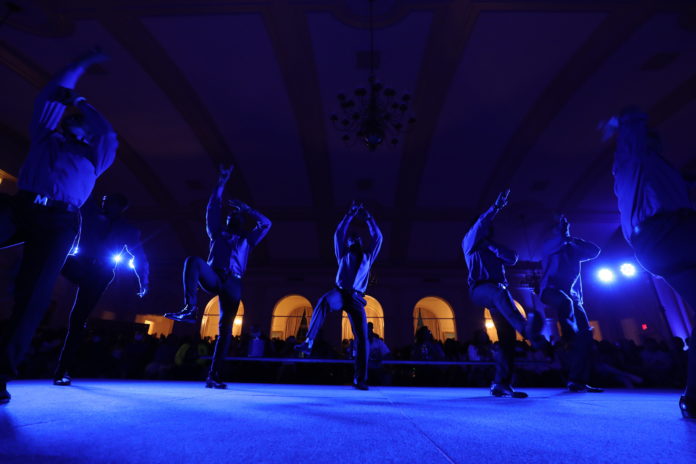
By Madison Martin | Reporter
The Annual Royal and Pure Homecoming Stroll-Off has become a Baylor Homecoming tradition for Black sororities and fraternities, allowing them to enter a competition and show off their teamwork and dance skills through the art of storytelling, which had been embedded historically in Black Greek culture. The event took place at the Bill Daniel Student Center, hosted by Phi Beta Sigma along with the National Pan-Hellenic Council (NPHC).
Strolling is a form of dance created by African people to show unity and strength through togetherness. It includes practiced moves that are only performed by members within the NPHC, with each sorority and fraternity having its own unique style to represent its organization. Whether performing at probates, stroll-offs or even on the dance floor, space is cleared out of respect for those who have “crossed over.”
This year, there were four competing teams: the Tau Alpha chapter of Alpha Phi Alpha, the Delta Theta chapter of Phi Beta Sigma, the Xi Chi chapter of Sigma Gamma Rho Nu Iota and the Pi Omicron chapter of Zeta Phi Beta.
Sam Onilenla — Aurora, Colo., senior and president of Baylor’s National Pan-Hellenic Council — said strolling and its importance has grown in the Black community.
“Strolling is a tradition started in the early 1920s by the Alpha Kappa Alpha Sorority, Incorporated,” Onilenla said. “It is popular among Divine Nine Black Greek letter organizations as well as other multicultural Greeks. Strolling, like step dancing, was meant to showcase African culture and pride at a time when Black Americans faced racism and discrimination.”
The tradition came from a time when African Americans pursued higher education while being excluded from integrating with existing sororities and fraternities. This led them to create their own safe spaces and build a sense of community when they faced rejection from other groups.
Forche Bridges — Fresno senior and historian of Baylor’s National Pan-Hellenic Council — said the Greek organizations offer inclusiveness while also maintaining the traditions the council and culture were founded upon.
“All of our Greek letter organizations and councils were founded during a time when African Americans didn’t have a lot of safe spaces,” Bridges said. “Though our organizations were founded upon uplifting our community, they’re not exclusive to only Black people. However, it is a main platform for getting our stories out there, sharing our history and enhancing the culture overall.”
Alumni judges from NPHC organizations — Dominique McShan, Geoffrey Griggs, Ramone Cooper, Toshia Jackson and De’Janae Tookes — attended the event and named the Tau Alpha chapter of Alpha Phi Alpha as the winner of this year’s homecoming stroll-off, with the Delta Theta chapter of Phi Beta Sigma coming in as a close runner-up.
Alpha Phi Alpha’s signature move is called “the train,” in which one simultaneously raises their leg and moves their arms up and down to represent the locomotion of a train. This was based on how the fraternity members used to travel, which was the first method of transportation in establishing other chapters.
Zakariyya Allen — Philadelphia junior and vice president of Baylor National Pan-Hellenic Council — said strolling not only creates a sense of community through dancing but also reveals distinct characteristics that each organization under the NPHC embodies.
“Strolling has been used for decades as a way for our organizations to unite together, as well as represent ourselves in distinctive ways,” Allen said. “It is significant because it allows Greek members to express themselves in a cultural manner. Strolling unifies members of the same organization through its many chapters and creates an opportunity to bond.”
This unbreakable bond is seen in the moves the Greek members perform, especially when strolling, as they’re taught never to break their line. This term refers to Black Greek organizations forming a line when performing their stroll to highlight the skills and uniqueness of their individual organizations. It shows how each member can count on one another and how, through unity, they work together to show their strength is unbreakable.
“It is important to continue this tradition because it allows the Baylor family to be familiar with the Black Greek organizations on campus and gain more of an understanding of what they do,” Onilenla said. “These are things we hold true to our specific organizations, and being able to showcase them to a campus who may not be as knowledgeable about it just highlights how important it is. It gives people the opportunity to get to know more about the Divine Nine.”





